
Reeling from 12 nonstop chaotic, heart wrenching days and one mass casualty event, our Shock Trauma Platoon Officers wait to fly out, grateful to be alive and leaving. Despite these smiles, sadness lingers with the knowledge of how many lives have been lost during the recent attack at Abbey Gate and the knowledge of how many Afghan families have been affected by the withdrawal. (See photo 5) ̶ Kat Landa, MD, FACEP
Explore This Issue
ACEP Now: Vol 41 – No 01 – January 2022Most of you probably remember exactly where you were and what you were doing on Sept. 11, 2001. A few weeks earlier, I had just arrived in New York to begin medical school. I took a photo from a ferry in the Hudson River on Aug. 25, 2001. Weeks later, while sitting in the lecture hall at NYU School of Medicine, my friends and I heard about a small plane crashing into one of the Twin Towers, setting it ablaze. At the end of the lecture, we rushed to the rooftop of Rubin Hall and stood horrified as the dust blowing to the east of the North Tower cleared just enough to reveal that the South Tower had already collapsed. Soon, in response to the horrific terrorist attacks that killed thousands of Americans in New York, DC, and Pennsylvania, our country would be at war, one that lasted a generation and one that emergency physicians from our Government Services Chapter have played an integral part. These reflections explore the memories of our service members and colleagues from 9/11, through the Global War on Terror, and to the final days of the withdrawal from Afghanistan. (See photos 1 and 2) —Cedric Dark, MD, MPH, FACEP, MEIC

PHOTO 1: A view from the Hudson River in August 2001.

PHOTO 2: The smoke emanating from the North Tower of the World Trade Center blurs with the debris cloud formed by the collapse of the South Tower.
Fighting for What’s Right
Bret T. Ackermann, DO, FAAEM, FACEP, Colonel, US Army (Retired)
I was a member of a medical team supporting multiple elements of U.S. Special Operations Command (USSOCOM) in Afghanistan 2004–2005. During this time, most of the public’s attention was on the war in Iraq, although combat operations were continuously occurring throughout Afghanistan. When not supporting direct action elements of USSOCOM, my medical team provided medical and surgical care to the local population, who had long-term sequelae of injuries sustained during Afghanistan’s war with the USSR or as a result of the unexploded ordinance leftover from that war. Thank you very much to the men and women of the U.S. and coalition partners with whom I served, and a special thank you and respect to the Afghan men and women who have known nothing but war and terror for generations yet continue to fight for their people and ideals. (See photos 3 and 4)
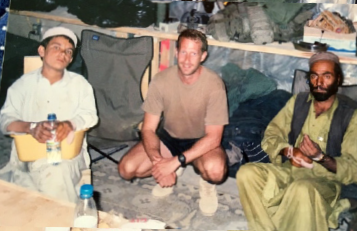
PHOTO 3: This child (left) and gentleman (right) sell DVDs at the local bazaar; after Dr. Ackermann’s team repaired their injuries, they gave the team a pretty good discount on their sales.

PHOTO 4: Dr. Ackermann on patrol in Afghanistan.
—
“We left things in a better state than when we got there”
Mark Antonacci, MD, FACEP
I deployed several times during my time on active duty, but my most memorable deployment was in 2010 as part of an Embedded Training Team based out of Forward Operating Base Lindsey in Kandahar Province. My team worked with the Afghan Army doctors, nurses, medics, and ancillary staff on a daily basis in their facility. It was (and likely still is) the Wild West of Afghanistan. Processing the events of the U.S. withdrawal over the last few months has been difficult. I just try to focus on the fact that we left things in a better state than when we got there. We were able to make life a little easier for many (especially the women and children) who otherwise would not have had access to any medical care. The individuals we trained were able to provide a standard of care to the local population well above the existing civilian medical system. I can only hope some of that care we provided has persisted despite the current Taliban regime.
—
“We Saved Them for a Good Life”
Torree McGowan, MD, FACEP
One of the most impactful things that happened to me when I was deployed in 2009 was having Operation Proper Exit come through my hospital. These men and women had been wounded in previous tours and were coming back through the country to see where they had been cared for. Most of them remembered getting hit and then would wake up at Brooke Army or Walter Reed and have a huge chunk of their life missing. Proper Exit let them come back and begin to process their trauma. Every one of them—most of whom were multiple amputees, had significant burns, and had survived other severe trauma—said we saved them for a good life. That kept me fighting to save them, no matter how badly they were injured.
—
“I was where I was needed…”
Leo Tanaka, MD, FACEP
On Sept. 11, 2011, the 10-year anniversary of 9/11, I was flying throughout Afghanistan on missions to pick up critically injured patients from forward operating locations (sometimes from unsecured airfields) and take them to a Role 3 higher level of care. I was proud of my work but sad about the devastation I saw. As medical director of a U.S. Air Force Pararescue unit that deployed so “that others may live,” I was where I was needed and where I could make the greatest impact. The mission remains, and there is still work to be done.
—
“I was useful and helping the good guys”
Yang Wang, MD
I was at Camp Bastion in 2012 from May to October as the Tactical Critical Care Evacuation Team (TCCET) physician. We flew more than 170 missions across Afghanistan, transporting patients from Role 2 to Role 3 hospitals.
Flying U.S. and coalition soldiers always felt good. I was useful and helping the good guys. But, more than half our patients were Afghan adults and children with amputations, open abdomens, burns, and devastating head injuries. Awake patients wore flat affects, no eye contact, and no acknowledgements. The rest were vented, swollen, broken. For every U.S. and coalition soldier I handed off, I knew they’d find world-class rehabilitative and psychological services at home. But what about my Afghan patients? Yes, we patched them up. But where would they find those same services?
Managing critical patients was thrilling and professionally rewarding. Mixing drips and push-dose pressors, setting up a-lines, IV pumps, and ventilators were skills I never learned in civilian residency, and it all made me a better physician today. I worked with the most diligent and grounded co-workers I’ve ever met.
Yet, remembering those Afghan patients, I’m relieved we have exited.
—
“You Really Lean On Your Training”
Roderick Fontenette, MD, FACEP
While deployed in 2014 in Afghanistan as part of the Tactical Critical Care Evacuation Team (TCCET) I was deployed far forward to care for members wounded at the point of injury and begin moving them toward a higher level of care. As an emergency physician deployed to resource-limited environments, you really lean on your training and focus on hemorrhage control and damage control resuscitation. On this deployment, we worked in the back of a UH-60 Black Hawk helicopter. The skills acquired in residency are instrumental when helping manage critically injured patients.
—
The NATO Effort to Fight COVID-19 in Afghanistan
Rory Stuart, MD, FACEP
Midway through our Bagram deployment in early 2020, COVID-19 exploded across the globe. U.S./NATO physicians and war planners were tasked with developing a viral response plan.
We began with a series of mitigation strategies: quarantine requirement for all inbound personnel, moving high-risk individuals out, social distancing, masking, closing gyms, and suspending nonessential travel. Critical care resources were collapsed into the Role 3s in Bagram and Kandahar.
Emergency physicians would decide which individuals would be tested, quarantined, admitted, or sent to isolation. In emergency medicine, we are trained to do more with less in the service of patients who often have few good options. Our deployed emergency medicine team took this ethos and tackled the biggest military medicine and logistical problem of the last century. In recognition of our contribution to the mission, Gen. Austin Miller personally awarded our team the Bronze Star prior to our departure.
—
The Call to Serve Their Nation
Max Lee, MD, FACEP
Deployments are times of uncertainty: Will I be able to do what I was trained to do? Will I come home safe? How will my family fare while I am away?
Deployments are also moments of serendipity where friends reconnect across the globe working along-side soldiers, Marines, airmen, and sailors who’ve answered the call to serve their nation. (See photo 6)

PHOTO 5: At Kandahar Airfield in January 2019, Dr. Kat Landa and Trauma Team Charlie prepare for an incoming mass casualty of Afghan Special Forces from a Taliban attack in Kandahar Province.

PHOTO 6: Medical school classmates gather at the 14th Combat Support Hospital, Bagram Airfield, Afghanistan. From left: retired Col. Brian Delmonaco (EM), retired Col. Max Lee (EM), retired Col. Christopher Lettieri (Critical Care), and retired Col. Shawn Taylor (EM).
—
Unique Bonds Formed
Sean Stuart, LCDR, MC, USN, D.O, FAAEM, FACEP, FAWM
The war in Afghanistan, like any war, had no lack of trials, tribulations, and losses. Yet the experiences and pride that came from our work there became defining moments in my life. Never has there been a better setting than a combat zone to emphasize the importance of those around you. It is not cliche to say these people became like family. Years later there are still emails, text messages, wedding invitations, and even the occasional reunion. Like the experiences there, the bonds formed are truly unique. (See photo 7)

PHOTO 7: On April 20, 2012, Dr. Sean Stuart in front of Marine Corps Base Kaneohe Bay in Hawaii.
Check out this month’s cover story online to see more photos from Afghanistan.
Pages: 1 2 3 4 | Multi-Page


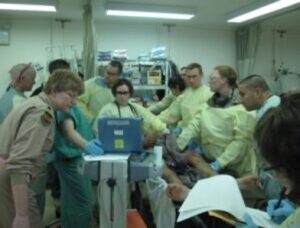

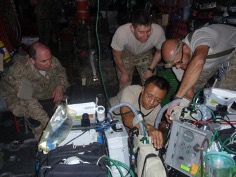
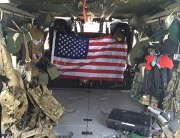
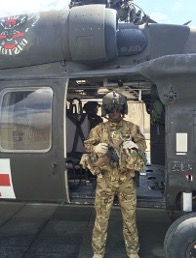
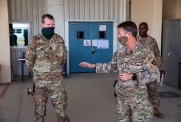


No Responses to “ACEP Government Services Chapter Docs Reflect on Time in Afghanistan”